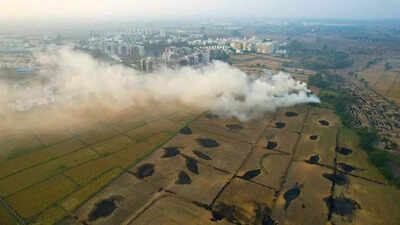Punjab government rolls out fresh strategy to combat stubble burning | Chandigarh News

PATIALA: In a renewed push to curb stubble burning ahead of the upcoming harvest season, the Punjab govt has issued fresh directives to district administrations to develop targeted strategies by categorising villages based on past instances of farm fires. The move aims to enable district-specific interventions using a data-backed, technology-driven approach.According to official instructions issued by the special DGP (Law & Order), villages are to be mapped and classified into three risk categories: High-risk: More than 30 incidents, Moderate-risk: 10 to 30 incidents, and Low-risk: 1 to 10 incidents. This classification will guide tailored enforcement and outreach activities. All field-level tasks — including village identification, risk mapping, and strategy formulation — must be completed by August 1, 2025. The new protocol, shaped during a recent high-level meeting of the Commission for Air Quality Management (CAQM), mandates joint planning sessions involving deputy commissioners, chief agriculture officers, and other key stakeholders. Authorities have been instructed to maintain proper documentation of all meetings and action plans. Farmers found engaging in stubble burning will face tiered penalties: ₹5,000 for each incident on less than 2 acres, ₹10,000 per incident for 2 to 5 acres and ₹30,000 per incident for farmers having more than 5 acres.Enforcement will follow a strict timeline, including detection to field verification within 48 hours, penalty issuance within 7 working days, and fine recovery within 15 days. Repeat offenders or those who fail to pay fines may face legal action under Section 223 of the Bharatiya Nyaya Sanhita (BNS). Police departments have been instructed to maintain a dedicated log of such FIRs.The revised SOP puts a strong emphasis on inter-departmental coordination and real-time tracking. The revenue department will be responsible for field verification, challan issuance, and fine collection; while the agriculture department is tasked with farmer outreach and promotion of sustainable practices. The Punjab Pollution Control Board (PPCB) will monitor, report, and validate incidents. PPCB officials confirmed that field personnel will receive training in interpreting satellite data, enforcing penalties, and following verification protocols.During the July 3 CAQM meeting, the chairperson emphasised the need for a “zero tolerance” policy, supported by real-time monitoring and community participation.“With daily dashboards, village-level mapping, and real-time surveillance, we’re adopting a proactive, tech-enabled strategy to reduce farm fires. The goal is early detection, swift enforcement, and collective action,” said a PPCB official. “This satellite-backed enforcement model may well become a blueprint for other agrarian states battling similar pollution and climate challenges,” the official added.




